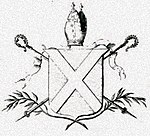Roger de Beaumont (bishop)
Roger de Beaumont | |
|---|---|
Roman Catholic Church | |
| Diocese | St Andrews |
| Appointed | 1189 |
| Term ended | 7 July 1202 |
| Predecessor | Hugh the Chaplain |
| Successor | William de Malveisin |
| Orders | |
| Consecration | 15 February 1198 by Richard de Lincoln |
| Personal details | |
| Died | 7 July 1202 Cambuskenneth, Scotland |
Roger de Beaumont (died 1202) was a 12th and 13th century
Bishop of St Andrews
.
Life
He was the son of
Chancellor of the King
, a post which usually functioned as a prelude to ascending a high-ranking bishopric.
Bishop of Saint Andrews
So it was that, at
St. Andrews by the Bishop of Moray and the Bishop of Aberdeen
.
During his time as chancellor, Beaumont had been party to the negotiations surrounding the nullification of the treaty of
Nidaros and York to superiority. These demands of the pope were both met, with Clement III issuing a Bull in 1188 confirming that church in Scotland was answerable only to the Holy See. The following year, 8 months after Beaumont's election as bishop, the English King Richard I
nullified the Treaty of Falaise, and recognised the independence of the Church.
Bishop Roger was witness to the foundation charter of Inchaffray Abbey in 1200, as earlier he had been for the Abbey of Arbroath in 1178, and it was during his tenure as Bishop that the first St Andrews Castle was built as an episcopal palace.
His episcopate came to an end when he died at Cambuskenneth on 7 July 1202. He was buried at St. Andrews. The next bishop of the see was William de Malveisin.
References
Notes
- ^ Cowan Vol I, p. 80. William's mother Ada de Warenne was daughter of Elizabeth of Vermandois' second husband the 2nd Earl of Surrey, whereas Roger's father was a grandson of her first marriage to the 1st Earl of Leicester.
Sources
- Cowan, Samuel, The Lord Chancellors of Scotland Edinburgh 1911. [1]
- Dowden, John, The Bishops of Scotland, ed. J. Maitland Thomson, (Glasgow, 1912)

